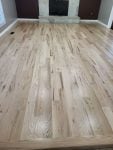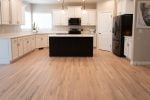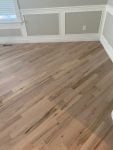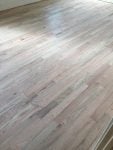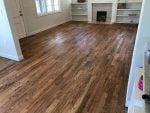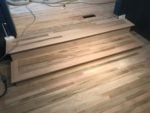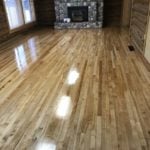As Engineered hardwood is becoming more popular, it’s important to understand the differences and be able to know when to use engineered hardwood over authentic hardwood.
What is Engineered Hardwood Made Of?
Engineered hardwood is a type of wood pieced together to make it more resistant to the elements than regular hardwood. The top layer is actual hardwood. Depending on the type and brand, this top layer could be anywhere from 1/16 to 1/8 of an inch thick. The rest of the layers are plywood and each layer is laid opposite each other to form a very hard and solid piece of wood.
As with regular hardwood, Engineered Hardwood comes in different qualities, wood species, and can also come pre-finished, if you prefer.

Engineered Hardwood vs. Regular Hardwood
What is the Cost Difference Between Engineered Hardwood and Regular Hardwood?
Engineered hardwood is normally higher in cost than regular hardwood. However, the labor costs to install engineered hardwood are usually lower. So, overall, the total cost of the materials and installation could be about the same for each type if comparing similar quality and installation methods.
In What Scenario Would Engineered Hardwood be Preferable over Regular Hardwood?
If your home only has a crawlspace rather than a basement, Engineered Hardwood would work better being installed on the main floor. This is because the crawlspace isn’t temperature or moisture-controlled. As temperature and moisture levels fluctuate, regular hardwood flooring would be susceptible to cupping and warping. In this case, Engineered Hardwood, with its layered plywood, would resist change or alterations because of temperature or humidity. Engineered Hardwood is also a great choice to use over concrete or radiant heating systems for the same reasons. In most other scenarios, deciding whether to go with regular hardwood or engineered hardwood would be a matter of personal preference.
Pros & Cons of Engineered Hardwood
Let’s start with the Pros:
- Engineered Hardwood can be installed almost any place regular hardwood can be installed.
- Engineered Hardwood is better installed anywhere temperature and moisture could be a problem such as over a crawlspace, on concrete or over radiant heating systems.
- Engineered Hardwood normally has lower installation costs.
- You can find an alternative Engineered Hardwood for most any hardwood flooring option.
And the Cons:
- Engineered Hardwood only has a thin layer of actual hardwood. Depending on the thickness, you may or may not be able to refinish it over time. Major dents and scratches may go beyond the hardwood and into the plywood, which couldn’t be fixed.
- Engineered Hardwood is higher in cost than it’s counterpart.
- Engineered Hardwood is still not as popular as authentic hardwood.
If you are thinking about engineered hardwood or authentic hardwood for your next project, please give us a call for a FREE estimate or Request a Bid.



